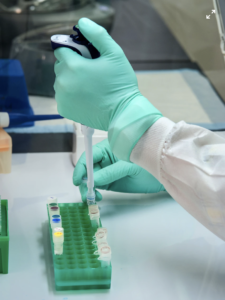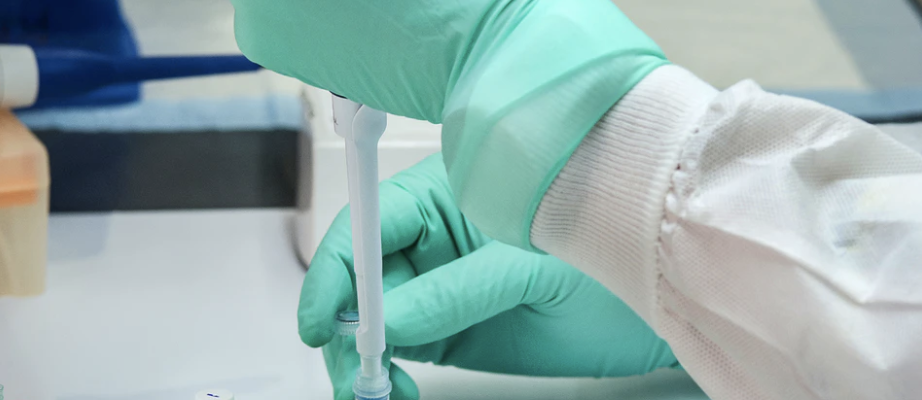What Lab Tests Should I Get From My Doctor?
Lab testing helps you feel better as quickly as possible.
I love data. I love functional lab tests. I love getting a new email that notifies me of a brand-spanking new set of numbers awaiting me in cyber space. My favorite client meetings are those in which we get to dig into the results of a functional lab test.

photo via unsplash from CDC
Gut infections.
Weird hormone levels.
The presence of heavy metals.
The cause of insomnia.
Food sensitivities.
All of these data points lead me toward a picture of the current health of a client, and give me concrete information on how to help them feel better fast.
And that is what it is all about, right?
However, not every client can invest in a DUTCH test or a GI Map or an Organic Acids panel. I hold my breath for the day that insurance companies see the value of true preventative health care and start allowing us to spend our dollars on actually feeling better, and not simply reacting to disease.
That won’t happen for years.
In the mean time, every women should have access to a basic lab panel from her general practitioner or her OB/GYN.
I am going to walk you through the tests you should ask for, and give you pointers on how to feel confident in demanding this data.
I get asked this question 2 or 3 times every week: what tests do I ask my doctor for? This post is for patient reference, and also selfish! Now I can simply direct you toward a post instead of typing each lab into my Instagram DM several times a week.
You have the right to ask for these labs. That is our first order of business. Your doctor works for you! If you get pushback from a physician who refuses to run labs on you, please find a new physician. Proactive, not reactive, please.
Your doctor will normally run a comprehensive CBC test, which is a full blood count test to check the quality of your blood, whether or not you are anemic, and whether or not your immune system is deficient.
Your doctor will also run your cholesterol markers. It is important to know that high cholesterol is a marker of inflammation. High cholesterol means there is something else going on with the body. I tell my clients that cholesterol is like a fire truck putting out a fire. If high cholesterol is there, food for hidden food sensitivities or infection.
Every cell in your body can create cholesterol, and cholesterol is necessary for hormone production and also brain and nervous system function. If you cut out all dietary cholesterol (or go on a statin, please NO!), your body will still create cholesterol. You need it. Look instead for ways to make changes to the diet and to stress levels.
Your provider should run your triglycerides as well. High triglycerides are more strongly correlated with heart trouble than are high cholesterol markers. Aim for triglycerides less than 150 milligrams per deciliter (mg/dL).
Lab Tests to Request
1. A Full Thyroid Panel: TSH, TPO antibodies, T4, T3, and Reverse T3.
Most doctors will simply run your TSH when you complain of low thyroid symptoms. TSH is a pituitary hormone. It absolutely does not give us a full picture of what is going on with your thyroid. I will often see elevated TSH and perfectly normal T4. Or elevated TSH and high T4 with a client who is on Synthroid. Yet the client still feels terrible- weight gain, insomnia, exhaustion, hair loss.
Elevated TSH just tells us that your brain is experiencing a large amount of stress and your body is trying to compensate. The pituitary gland in your brain sends out TSH (thyroid stimulating hormone) to do just that- stimulate the thyroid to produce more active thyroid hormone. When TSH is elevated, it tells us that the brain thinks that the body needs a metabolic boost due to stress. Elevated TSH means that the brain is telling the body to produce more thyroid hormone so that the body can regulate metabolism.
Whatever thyroid hormone is being produced is not being used effectively. You are tired and libido-less and hairless and anxious.
High TSH simply tells us that your thyroid is malfunctioning.
High TSH- hypothyroid (low function)
Low TSH- hyperthyroid (excessively high function)
When TSH is high, most doctors will write you a prescription for Synthroid, which is a synthetic T4. T4 is the inactive form of thyroid hormone.
T4 must convert to T3 in order for the body to actually use it.
Therefore, you could be on very high doses of Synthroid, but if your body is not converting it to T3 properly, you will still feel like crap.
And possibly, even more like crap. If your body is converting T4 to reverse T3 instead of active T3, you are getting a pool of reverse T3 in the bloodstream, which can actually slow down your metabolism.
Synthroid can make you worse! Dear Barbara.
This is why you need to demand a full thyroid panel. Press for T3, reverse T3, as well as the T4.
Make sure you also ask for TPO antibodies.
Thyroid Peroxidase Antibodies are the markers for Hashimoto’s disease. This is an autoimmune condition where your body starts to attack its own thyroid gland.
If I have a client that presents with TPO antibodies, I will run a full Epstein Barr panel too, as the two are intricately correlated.
TPO antibodies over 30 indicate that you are a candidate for Hashimoto’s disease. This is a manageable condition. Using FDN techniques, I have been able to get my own antibodies down from over 100 to 2! Some will present with numbers much higher than this, though.
You want to know if you have Hashimoto’s or not. Ask for the antibody marker.
Please read the brilliant Dr. Westin Childs for further information:
High TSH Symptoms: Causes and What it Means
Optimal levels :
TPO: under 15 IU/mL
TSH: 1.8-2.5 mlU/L
T3: 100-180 ng/DL
Reverse T3: 9.2-24.1 ng/DL
2. A Full Epstein Barr Panel
Since 95% of women have markers for latent Epstein Barr (EBV), it is wise to see whether or not you carry the markers and whether or not you are in a flare.
You will start to notice symptoms of your flares, and then you can act accordingly.
When I am under too much stress, I will get a tiny wart on my finger. This has always correlated to reactivation markers on my EBV panel. So when a wart pops up, I know to start taking it easy and also up my EBV supplement protocol.
Flare symptoms include:
Exhaustion
A buzzing or ringing headache
Migraines
Skin Problems
Digestive Problems
Thyroid Problems
Among many others.
If you are exhausted despite eating a good diet and resting well, ask for this panel:
- The presence of VCA IgG antibodies indicates that an EBV infection has occurred at some time recently or in the past.
- The presence of VCA IgM antibodies and the absence of antibodies to EBNA mean that the infection has occurred recently.
- The presence of antibodies to EBNA means that the infection occurred in the past. Antibodies to EBNA develop six to eight weeks after the time of infection and are present for life.
Optimal Levels: 0 across the board
3. ANA Antibodies
If you suspect any autoimmune disease, ask for your ANA antibody titers. A positive titer usually means an autoimmune diagnosis of Lupus, Fibromyalgia, Rheumatoid Arthritis, or assorted other autoimmune diseases.
It is good to rule this one out, especially if you are experiencing joint or muscle pain, light sensitivity, exhaustion, hair loss, rashes, or mild fevers.
Optimal Levels: Negative Titers
4. Vitamin D.
Every single person I test has low Vitamin D levels. My client population is special, though- mostly women who are suffering from autoimmune disease. Correlation is not causation, but I see and suspect the fact that low Vitamin D levels are strongly associated with autoimmune disease.
Optimal levels: 80-100
5. C-Reactive Protein
Inflammation (that catch-all term!) in the body forces the liver to pump out C-reactive proteins. If your C-Reactive protein is high, then your inflammation levels are high. High inflammatory markers can indicate autoimmune disease, heart trouble, arterial trouble, infection, and other things.
Optimal Levels: less than 1.0 mg/L
6. Homocysteine
High homocysteine is also a marker for inflammation and cardiovascular disease, but it can also be used to predict the onset of Alzheimers.
Optimal levels: between 5 and 15 µmol/L
7. Fasted Morning Glucose
Your glucose levels should be between 80-120 when you have no food in your system. Anything over 120 puts you into the pre-diabetic range. Low blood sugar can actually indicate the same thing.
8. Fasted Morning Cortisol
I always ask my clients to include this marker in their physician-ordered labs. Get your labs done as early as possible. Total cortisol production for the day should be around 35-40. If it is higher than that without food, you have a problem. Most usually, it is a stress problem, but there could be delayed food sensitivities or infections that we have to look at.
If morning cortisol is less than 10 mcg/dL, you have reason to feel the exhaustion you are feeling. Cortisol is your “get up and go” hormone- nature’s alarm clock. I love looking at cortisol in the morning to get a picture of a normal sleep/wake cycle.
Optimal Morning Cortisol: 10 to 20 micrograms per deciliter (mcg/dL)
9. Vitamin B12 and Folate
These are markers of energy. If low, you will feel it.
Optimal Levels:
Vitamin B12: 500 pg/mL ; Folate: 2.2 to 3.2 mg/dL
10. Ha1c and Insulin
If your Ha1c is high, you are prediabetic. If your insulin is high, you are insulin resistant. You want neither of these things, believe me!
Optimal Levels: Ha1c: 4% – 5.6%; Insulin: 4-5.
Most of these tests can be run easily at any lab. If your doctor gives you pushback, contact an alternative care provider (hand raised). You should run these labs on yourself at least once a year.
If you need help interpreting your labs, get ahold of me. If your doctor tells you your labs look normal and you still feel terrible, get ahold of me. Everyone gets a free 15 minute conversation. I will be able to give you some immediate action points during our call. We can’t go over your whole lab panel in detail in 15 minutes, but you can ask any questions you want during that time.
Click here to book your free consultation with Jennifer
Take this guide with you to your next doctor’s appointment so you feel confident in asking for the bloodwork you need to get a better picture of health.
To yours-
Jennifer






